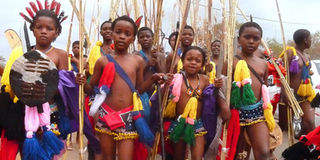Swaziland music festival strikes controversial note

Swazi girls carry reeds on September 2, 2012 as they arrive to dance for King Mswati III at the Ludzidzini royal palace in Mbabane. Swaziland's eclectic Bushfire Festival attracts around 20,000 music lovers each year. Photo/AFP
What you need to know:
- King Mswati III presides over an absolute monarchy which has for decades banned political parties and detained journalists and pro-democracy activists.
Swaziland's eclectic Bushfire Festival attracts around 20,000 music lovers each year and, because it takes place in Africa's last absolute monarchy, a fair bit of controversy.
Revellers sway under the warm southern African sun -- and perhaps the influence of some strong local herbs -- in the idyllic Ezulwini valley south of the capital Mbabane, lapping up three days of world class music.
Four-time festival veteran Christopher Jost, from Germany, was among those who travelled to the tiny southern African kingdom to take in bands like South Africa's Ladysmith Black Mambazo and Zimbabwean maestro Oliver Mtukudzi from May 30 to June 1.
But in Swaziland politics is never too far away.
Jost notes there seems to be little diversity in the country's media and that locals are reluctant to criticise the King, who has a palace a short distance away.
King Mswati III presides over an absolute monarchy which has for decades banned political parties and detained journalists and pro-democracy activists.
"As a Swazi," Jost said, "you don't want to piss off the King. As a foreigner it doesn't really matter because you can just leave."
Harriet Fowler, a Briton currently living in Uganda, came back to Swaziland for the festival, having lived in the country in the late 1970s.
"The population has doubled since we lived here. There is a lot of evident poverty and the HIV is pretty bad," she said.
According to UNICEF -- a festival partner -- Swaziland has the highest HIV prevalence rate in the world.
Some Swazi human rights groups have called on artists and visitors to boycott the event.
Lucky Lukhele of the Swaziland Solidarity Network, says the festival benefits the monarchy and gives the world the impression the country is running well, while people are languishing in poverty and dissent is not tolerated.
'Energy on stage'
Some of the artists who heeded the call for a boycott over the years include South African stars Black Coffee, Lira, Mzwakhe Mbuli and Caiphus Semenya.
But others believe a cultural embargo may be counterproductive.
Sibongiseni Shabalala, a member of Grammy award winning group Ladysmith Black Mambazo, said they perform where their audiences are and if there is to be a boycott it should be approached in the right way.
Shabalala accused the Swaziland Solidarity Network's Lukhele for trying to strong-arm artists.
"He is looking for support in the wrong way. He is bullying artists. He should have looked for us and talked to us so we can work out a solution. He never even met with us."
Shabalala said the group enjoyed their Bushfire performance.
"In Swaziland we enjoyed the performance because the audience was very responsive. Every time we get a response from the audience, it also gives us energy on stage."
Concertgoer Fowler is adamant that attending Bushfire is not the same as supporting the government.
"You are coming to a festival in a private place, it is not like you are coming to the government. We are spending money to boost local tourism and not necessarily on the government."
Some locals agree.
Ncamiso Kunene, who was hired to pick up rubbish at the festival, said the people in the area looked forward to the Bushfire weekend because it provided them with jobs.
"There are not a lot of jobs here for young people, we mostly sell firewood. But we look forward to the festival because we can get jobs."
Another local Phinda Methula, who works as a welder in the area, said he only wished the Bushfire tickets were more affordable for locals so they could also be part of the experience.
"Lots of locals would like to come but it is too expensive. Maybe they should charge us a lesser price because we can't afford it. It is 360 rand ($36) for a ticket and I make 1,600 rand ($149) a month, so what am I going to drink when I get inside?"
The festival bills itself as "100 percent socially responsible" and festival director Jiggs Thorne stresses it generates about 30 million rand ($2.8 million) for the local economy and all profits are donated to local charities.
The festival normally shies away from the political, but this year was a little different.
Zimbabwean parody group Zambezi News drew some nervous laughter with jabs at the Swazi monarch and his politics -- an unusual and daring exploit for Bushfire.
At one point in the sketch a fake Zimbabwean minister said he drew inspiration from neighbouring countries.
"Swaziland has succeeded in delaying democracy for years," he said.
Festival director Thorne said he wasn't aware of the act's content before they performed.
"The satire addresses relevant issues," he said, adding that it should be done in a "respectful way".





